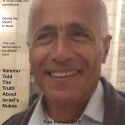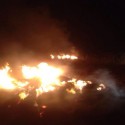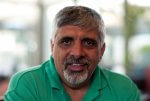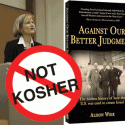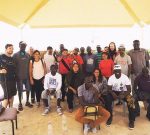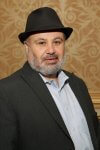By Eileen Fleming
On Thursday Israel’s Nuclear Whistleblower Mordechai Vanunu reported:
May 7.2015
The latest news in my case, the Freedom again was postponed. The freedom we are waiting for, it did not come, and instead, I got the renew of restrictions, for the 12th year since 2004.Paying a libel suit to the Israel news paper:
The campaign ended this past day, and thanks to you, you made it easily over our $10,000 goal!
Each one of you have already help to make the way to freedom open and very ready, and make it clear to Israel authorities, you want and support me in my struggle to be free, to leave Israel and to start new life.
Not only did we make our goal, but as a result of relationships built over the past month, we also have shown to all the world, how the Israel state, democracy, and justice system have been manipulated, damaged Israel image in all over the world, by such injustice, verdict, in this Libel suit, and all my supporters are very upset, and anger by Israel treatment to me since 1986.
I will send out further updates as I have them on any future development in my struggle for freedom.
I am also currently waiting to hear from Israel Authority about the future.
Again, I will be sending out additional updates – Thank you to each and every one of you for supporting this campaign and I’m really looking forward to rewarding that support with great, fun new content to help…
In 2005 while interviewing Vanunu about his childhood I asked, “Did you have fun?”
Vanunu replied:
“It was fun to watch the gymnasts perform at the bazaar; I would watch them for hours. I wouldn’t go home until after dark, and we lived in an apartment quadrangle. There were four families on each of the two floors, and we shared the rooftop and courtyard. There was no electricity, no running water, and no sewer. My very first memory is of when I was four years old and my mother had to run downstairs for a while. She told me to keep an eye on my newborn sister, and as soon as I was alone, I found out the difference between girls and boys…
“I grew up in an Orthodox Jewish home, but rejected it all by the eighth grade. When I went to the University, I became an existentialist. When I was eight years old I stole some money for the first and last time. My father would take my older brother Al and I to his grocery store whenever we weren’t in school. Al would always go into the back and play with boxes, but I stayed up front, and listened and learned.
“One Friday afternoon, my father told me to watch the register, as he had to run out somewhere. There was one hundred shekels in the money box, and I put it in my pocket as soon as he left. When he returned, the first thing he did was look into the box, and then he asked me, ‘Where is the money? Did you take it?’
“I saw no way out and, in my panic, I lied and said something stupid. ‘No no, I didn’t take it; go ahead and check my pocket.’ He did, and he found the money and began to beat me with a belt. He wounded me a little in my head. That was the day I learned not to steal, but it was not until the next day when I learned not to lie.
“The next day at school, the teacher demanded that we all uncover our heads. When I did, the teacher saw my wound, and he sent me to the principal, who asked, ‘What happened to you?’ I didn’t want to admit that my father beat me, so I told him some Arabs had beaten me up. He called the police and my lie made a lot of trouble for some innocent guys, and I have never lied since then.”
I inquired, “So, you were always a good boy?”
Vanunu readily replied, “Yes, I was a good student and stayed out of trouble.”
I blurted out, “Have you always been stubborn?”
Vanunu thought for a very long time then said:
“When I was thirteen years old, I got mad at my parents and decided I would punish them. I began my first hunger strike and it lasted three days. My parents acted like they didn’t care, and it was not until I got very weak that I got their attention. I also remember getting really mad at my mother before a Jewish holiday. I had new clothes I wanted to wear on Friday night, but she insisted that I wait until the next day. We locked horns, but she had the power and won in the end. I fumed the entire evening.”
I interrupted, “So, this was when you had been in Israel for about five years?”
Vanunu elaborated:
“Yes, in 1963 the Zionists came to my village and encouraged everyone to migrate to Israel. There was no family discussion; my father just told us we were leaving, and six months later, we boarded the train to Casablanca and got on a World War II military ship. The ship kept going up and down, and everyone was crammed into an open space; people everywhere kept throwing up. After four days, we arrived in Marseilles. This was a great place, but we had to leave for Israel. The next boat was bigger and modern, and the journey was smoother. When we arrived in Israel, the Interior Minister assigned us to Beersheba, but all the rest of our family had been assigned to Nazareth, and we wanted to go there, too. We had no choice, and home was a small hut in the desert. There was nothing in it and we had nothing much with us. After a few days, my mother left for Nazareth; it was chaos, and we had nothing to do to occupy us.
“Outside, there was only desert, but I walked a few hours everyday so I could be in the Old City. I started exploring around a Mexican-looking town, never talking with anyone, but always watching everyone. Three weeks later, my mother returned, and then my uncle, Joseph, arrived and took us up north to see some more newly arrived family. We stayed for two months, and then moved into a new apartment in Beersheba. I went to the fifth grade and met a few friends, but they were strange people. They were Romanians and a lot of Middle Easterners, who used bad language and seemed cheap to me. Even the school supplies were inferior to those I had had in Morocco. Even the ice cream was not ice cream; it was just ice, and there was no Pepsi.
“I didn’t like it at all, and wondered why I had to be there. There were only Jewish people around; I never saw an Arab or Palestinian then, and the old mosque was uninhabited. My mother had babies every two years. I preferred to be alone, but I was never lonely. Even when I walked with my father on Saturday to pray, I didn’t talk, but I wondered about God and truth. My father became even more orthodox as I turned away. I couldn’t accept all the teachings and decided I would not accept any of them.
“At fourteen years old, I began to doubt, and by sixteen, I left Judaism for good. I didn’t know if God even existed, and I didn’t even care. I decided I would decide for myself what is good and what is bad; I didn’t need anyone telling me the rules. For me, it was about doing to others what I wanted them to do to me; I didn’t need any other rule. I was sent to Yeshiva, the Jewish boarding school in the Old City. I experienced a great disconnect from God. I didn’t talk to anyone about any of it. I kept everything within and continued to wonder about finding my way, my direction, and the purpose of my life. I have always searched for answers.
“I kept my mouth shut about not following the faith and excelled in secular studies. With everything else, I just went through the motions–in the eleventh grade, two friends and I were listening to the radio. It is a big sin and crime to use electricity on the Sabbath. The rabbi caught us and called my father to come get me, and when we had almost reached our house, I smelled that he was going to beat me, so I ran the five meters back to school without looking back. The next day, the rabbi sent me for an intensive week of Jewish studies. I was angry for the entire week. After that, I returned back to my boarding room. My two friends and I had become outcasts; we were forever ignored by the other students. The isolation became very comfortable, and I began walking in the desert alone every night without any fear. I would just walk around and imagine that I would find my way, and have some success.”
“I passed all my classes except for English and Hebrew studies. At eighteen years old, I had my mind and health checked by the Israeli army doctors and was assigned to be a pilot. But I failed the hand-eye coordination test and was assigned to the Navy, instead. Three weeks later, they sent me to the Engineering Unit, where I learned about land mines, bridges, and explosives. I started training with fifty others and was the most unenthusiastic of the bunch. I stood back from it all and saw it as if it were just playing stupid games. Mostly, everyone else was serious, but I just didn’t care; all I could see was the futility. The day I left home for the service, my mother walked me to the bus. She gave me all the Jewish stuff–you know, the phylacteries? The leather straps for the head and left arm? I put it all aside until I got my first leave, and then I returned it all home and never said a word about it. I never spoke with my parents about rejecting their faith.
“When I was in prison, my mother came to me and told me that I was suffering because I was a Christian. I know I caused them a lot of pain, and they have suffered because of my case. I forgive them, even though they rejected me and my Christian faith. I have always thought for myself and made up my own mind. As a young boy, I thought too many of the rules of Judaism were of no use–like the rule that says you can’t mix meat and cheese together. Well, the first time I did, nothing happened, so then I began turning on the lights on Saturday. I tried to experience everything that had been forbidden. That first Yom Kippur I didn’t fast, didn’t pray, and felt totally free for the first time in my life.”
I asked again, “Ok, so did you start having fun?”
Vanunu continued:
“No, still no fun, but I finally met some secular Jews, traveled freely as a soldier, and served in the occupied territories near Bethlehem. I would make treks of fifteen miles through villages, and I felt how poor the people were under occupation and how they suffered without reason, except for the reason of injustice. In the 1970s, Israel built many fortresses and spent lots of money on equipment, but nothing on the people I saw, who were oppressed and under occupation.
“I got really mad and upset every time I thought about how much money they wasted, but I kept my mouth shut and kept it all to myself. After a year, I finished my training and was assigned to train more soldiers. For me it was all futility and waste; I saw these children become soldiers and thought, what a complete waste.
“When the Yom Kippur War broke out, I was home on leave. I returned the next day to my station near Ramallah. Soldiers with less than a month of training got called to go with me to the Jordan Valley. There weren’t enough trained troops, and we were lucky we didn’t see any fighting and got to return to base after three days. After a few months, we all went to Syria and the Golan Heights.
“When Kissinger coordinated the cease-fire, the Israeli army destroyed the area before leaving there. I was promoted to First Sergeant, and they wanted me to re-up. I said no.
“I began my studies at Tel Aviv University when I was twenty-one. I studied physics until the army called me up for thirty days’ reserve service. When I returned to school, I couldn’t catch up. I worked in a bakery at night and attended class all day. This was the first time I met Palestinians as human beings. I began attending political demonstrations inside the university. It was all about equal human rights and respecting all others. By the time I was twenty-three, I began working at the Dimona. It was suppose to be a textile plant, but I was hired for the control room. At the time, I had no idea what it was in control of.
“I really didn’t even want the job; I tried to get them not to hire me. On the application, they asked if I knew any Palestinians. As I had an acquaintance, I said yes, hoping it would disqualify me from employment. They accepted me anyway. I watched them as closely as they watched me. I began studying philosophy and geography, and read literature.”
I interjected, “Did you listen to music? Did you know the Beatles and Bob Dylan?”
Vanunu continued:
“Sure, but I prefer classical. And I began wondering more about life and politics. I decided to become a hermit and vegetarian. I lived alone, but never was lonely. It wasn’t ever fun, but I enjoy the quiet. I was never sad, but never happy, either. After a year, I got bored with the routine job at the Dimona and wanted to leave. I went to Beersheba University and studied economics for a year.
“I became involved in university politics and in student unions. I was all about protecting Palestinian students’ rights. I sided with Palestinians more and more, and was invited to help establish a group of Palestinian and Jewish students for peace and justice. This was also the time I found out that it was dangerous for me to speak the truth. I was being watched, but I continued to express myself anyway. After six months, I got called in by security at the Dimona, and they asked me, ‘Can you imagine why you are here?’
“I answered, ‘My university activity?’ They then questioned me about all my contacts and told me to stop, because I was in danger. I told them I would try, but I knew I would continue on, because it was the right cause and I would not hide my thoughts.
“After five months, they called me in again and demanded that I stop my activities. A few months later, the chief security man took me to the Tel Aviv Secret Room, where the Israeli army security officer grilled me. They told me I could get fifteen years in prison if I didn’t stop my university activities. I left the meeting and walked to a Palestinian bookstore, knowing they were watching me. That night, I wrote in my diary, ‘1/85. I should have finished this job at Dimona before now. Time to quit.’
“I finished the university with a BA in philosophy and geography, and made plans to leave Israel and begin a new life in America. In August of 1985, I was put on a list of people who should be dismissed from the Dimona. They were laying off 10 percent, but when they told me I was going, I confronted them with ‘Why are you dismissing me? I am a good worker; you are getting rid of me for political reasons, aren’t you?’ The union protected me, and after two months, they told me they were transferring me to a less secure area.
“I told them I would stay where I was, or else I would resign. They said, ‘Okay, resign.’ And I did. I had already shot the two rolls of film. I worked the night shift and had lots of time alone. I found the keys to the restricted areas in the shower room. I left the film in my locker for a few days before taking it out of the Dimona. I knew they were watching me.
“I left Israel in January of 1986, and went to search for someone to share my story with. I didn’t develop the film until six months later. I was waiting until I found a newspaper that would cover the story.
“I met a Canadian author on my way to Greece, but nothing came of it. I traveled to Athens, Bangkok, and then went to Russia. I was 32 years old in a Moscow hotel, wondering if I should tell my story to the Red Army. I decided to leave, instead. The reason I had arrived there was that before I left the Dimona, I had checked out the Palestinian Communist Party to see how the communists worked. I was curious and wondered if they would help me once I left Israel. But when I witnessed the poverty and nothing but military cars everywhere, I decided to get out of there.
“I went to the Far East and met some people who had run away from Chernobyl, and I told them about the Dimona. Two weeks later I arrived in Sydney and stayed for six months. I went to St. John Anglican Church and became friends with the people I met there. I got a job driving a taxi and met a freelance journalist named Gervevo; I told him my story, and he was enthusiastic to help me get it out. He thought I wanted to make money on it, but I told him I just wanted to prevent a nuclear war and contribute to a positive change in the Middle East. Then I met Peter Hounam…..
My first 2 questions to Mordechai Vanunu:
Vanunu added:
“I really had no clue what I was doing by getting baptized a Christian; I just felt like I had to do it. It was my way to become a new being. It wasn’t until after my trial that I started to read the New Testament. While I was in prison, I would read aloud for a half hour, twice a day. I would read the entire New Testament and begin it again when I finished the Book of Revelation. I did this for myself, as well as for my captors–not so much the prison guards, but the ones who watched me on camera twenty-four hours a day. Once I covered up the camera that spied on me and was punished with one month in solitary, without any books or radio; no contact with anyone anywhere was allowed. It was just them, watching me, constantly watching me.”
I interrupted with “Who are they?”
Vanunu explained:
“The Shen Beet, you know, like the FBI and the Mossad, like your CIA— they were watching me. They tortured me by keeping a light on in my cell constantly for two years. They told me it was because they were afraid I would commit suicide, and the oppressive camera was for my safety. They recruited the guards and other prisoners to irritate me. They would deprive me of sleep by making loud noises near my cell all night long. I chose to read them 1 Corinthians 13 instead.”
Love is patient, love is kind. It does not envy, it does not boast, it is not proud. It is not rude, it is not self-seeking, it is not easily angered, and it keeps no record of wrongs. Love does not delight in evil but rejoices with THE TRUTH! It always protects, it always trusts, always hopes, and always perseveres. Love never fails. 1 Corinthians 13:4-8
In this excerpt from 30 Minutes with Vanunu Israel’s Nuclear Whistle Blower addresses State Torture by Solitary Confinement taped a few weeks after Vanunu’s FREEDOM of SPEECH Trial began in January 2006 all because he spoke to foreign media in 2004!
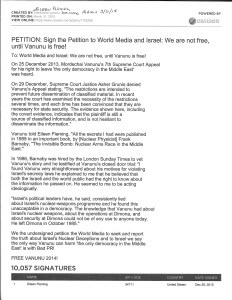
Learn More:
Will #TDSBreakingNews report what NYT has Not? #FreeVanunu @TheDailyShow
The Daily Show and Israeli Apartheid #FreeVanunu #TDS @Trevornoah @TheDailyShow
Mordechai Vanunu: Cases of Libel and Extortion Security and Press
U.S. Documents Corroborate Mordechai Vanunu RE: Israeli WMD
Resurrection of Mordechai Vanunu Ends the Legend of Vanunu
The Vanunu Legend: Israel’s Nuclear Whistleblower’s Struggle for Freedom


- Vanunu still has more nuclear secrets to spill, Israeli court declares - December 29, 2021
- 9/11 and a 20th Reflection of That Day - September 5, 2021
- Mordechai Vanunu: Final Annual Update and this Writers Next Steps - June 19, 2021













